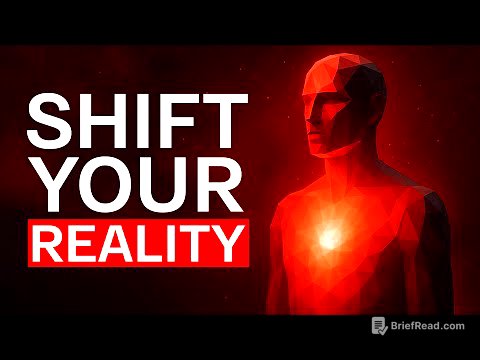TLDR;
This video addresses the importance of rest and recovery in modern life, particularly for individuals prone to burnout, anxiety, and perfectionism. It explores why some people struggle to rest, the types of rest that are not truly restorative, and the secrets of those who rest well. The video also provides practical tips for finding personalized rest techniques, managing time constraints, improving sleep, and overcoming the guilt associated with taking breaks.
- Many people struggle with rest due to perfectionism, societal pressures, and a work-centric identity.
- Ineffective rest methods like excessive scrolling, compulsive shopping, and substance use can lead to addiction and health problems.
- Effective rest involves activities that provide genuine positive sensations and feelings, tailored to individual needs.
- Even short breaks with focused attention on positive sensations or mindful breathing can significantly improve recovery.
- Prioritizing sleep, especially maintaining a consistent sleep schedule and exposure to natural light, is crucial for overall well-being.
- Overcoming the guilt associated with rest requires recognizing its importance for sustained productivity and mental health, and retraining the brain to view rest as safe and beneficial.
우울증? 조울증? ADHD? 치매? [0:00]
The speaker discusses how many people experiencing burnout often visit the clinic, feeling anxious and tense. They may or may not work a lot, but their bodies and minds are constantly stressed. This leads to chronic fatigue, where even minimal activity feels incredibly heavy. Despite exhaustion, they struggle to sleep deeply, remaining in a perpetual state of tension. Some individuals become so weakened that they require crutches to move. These patients often seek help from various specialists, undergoing numerous tests, only to find no physical cause, leading them to psychiatry. This condition is often diagnosed as chronic fatigue syndrome, resulting from prolonged stress that affects the brain's structure and function. This can manifest as impaired memory and attention, resembling ADHD or dementia, as well as difficulties in emotional and impulse control, potentially leading to addiction and symptoms of depression or bipolar disorder.
지금 내 상태는? [0:17]
One major reason people struggle to rest is perfectionism. Perfectionists often have high standards for themselves and harshly criticize themselves and others. They focus heavily on outcomes, leading to constant anxiety and an inability to relax until they achieve a result. They fear that relaxing or making mistakes will lead to significant negative consequences, creating a cycle of stress and tension. These individuals may have had past experiences where relaxing led to failure or mistakes, which reinforces the belief that rest leads to misfortune. This association causes anxiety during free time, making them prefer being busy. They also feel they must rest "correctly," achieving something even during their downtime, which prevents them from truly relaxing.
내가 못 쉬는 이유는? [1:39]
Many people feel guilty when resting due to societal and workplace pressures. They grew up hearing that leisure is wasteful and that others are always doing more. In workplaces that value long hours and constant work, taking breaks can feel like a sign of weakness or lack of dedication. This creates an automatic association between rest and failure. Even a short break on the couch can trigger feelings of laziness and guilt. Some individuals identify strongly with their work, defining themselves solely by their job. When they stop working, they feel a loss of identity, emptiness, and worthlessness, which undermines their self-esteem. This can lead retirees or those on leave to seek out work just to feel valuable. Additionally, some people struggle to say no and prioritize the needs of others, feeling selfish when they focus on themselves. They may overcommit to helping others, rationalizing that it benefits everyone, and thus neglect their own need for rest.
(이렇게 쉴 바에는 그냥 쉬지 마세요…) [6:12]
Many people engage in unsuitable forms of rest. For some, lying down and doing nothing is essential for relaxation, especially after being overworked and stressed. However, for those who react to stress by becoming mentally foggy, lethargic, or overly sleepy, prolonged inactivity can worsen these symptoms and cause headaches. Therefore, simply lying down may not be the best form of rest for them. Scrolling through social media and watching short videos is another common way people try to relax. While the body may be still, the brain is constantly stimulated, leading to cognitive overload. This type of rest can be addictive and difficult to control, often resulting in extended periods of use and physical discomfort such as eye strain and muscle pain. Compulsive shopping, driven by the satisfaction of clicking and buying, can also be a problematic form of rest. It can lead to financial strain and addictive behaviors, making it an unsustainable long-term strategy. Similarly, using substances like alcohol to relax can be tempting due to the immediate sense of ease and pleasure they provide. However, these methods are also highly addictive, and the need for increased amounts and frequency can lead to long-term health issues. It's important to assess whether a rest method is controllable and does not negatively impact long-term health.
잘 쉬는 사람들의 비밀 [9:15]
A key aspect of mental health is the ability to self-soothe and relax when stressed, and to find joy and energy when feeling depleted. This ability to self-regulate is where rest plays a crucial role. The primary condition for effective rest is experiencing clear positive sensations or emotions during the activity. For example, someone might say they relax by playing video games, but when asked if they feel truly joyful, immersed, and relaxed while playing, they may admit they don't. They might just be playing out of habit because they can't find anything else enjoyable. True rest involves feeling a sense of relief from tension, such as a reduction in headaches or muscle stiffness. It also means feeling less sensitive to stimuli and more mentally clear. Most importantly, it involves experiencing genuine pleasure and satisfaction during the activity, leading to a sense of rejuvenation afterward.
나만의 휴식법 찾는 방법 2가지 [10:55]
To design a personalized rest plan, it's essential to be aware of your current emotional and physical state. Ask yourself if you feel lethargic, forgetful, and have poor concentration, or if you are tense, with a racing heart, shallow breathing, and muscle tension. Identify any physical discomfort and assess whether your mind feels chaotic, frozen, anxious, or overly sensitive. Many people struggle to articulate their current state, so it's helpful to put it into words. If you've been under constant stress and mental overload, aim for activities that promote relaxation, warmth, and stability. If you feel lethargic and heavy, choose activities that boost energy and joy. Avoid passive rest out of obligation; instead, actively consider what sensations you need and choose activities accordingly. For example, if you feel tense and have muscle pain, acknowledge these feelings and decide to relax. Instead of just lying down, actively try to release tension, let go of negative thoughts, and soothe your muscles. Use tools like calming music or aromatherapy to enhance relaxation. By consciously choosing to rest in a way that addresses your specific needs, you can deepen relaxation and increase the effectiveness of your rest. Similarly, when seeking joy and energy, commit fully to the activity to maximize its benefits.
도저히 쉴 시간이 없다면? [13:59]
Even short breaks of 5 to 10 minutes can be effective for recovery. One of the most basic and accessible techniques is mindful breathing, which involves focusing on the physical sensations of breathing. This practice requires no special tools or environments and can be done anywhere, anytime. By simply paying attention to your breath, you can achieve a state of mindfulness. For example, during a busy day, taking even a minute to focus on your breath can help relax your body and mind before continuing with your tasks. Concentrating on positive sensations can also be very restorative. Identify something that brings you joy or comfort and mindfully engage with it. For example, if you enjoy the scent of tea or coffee, take a moment to deeply inhale its aroma, noticing how it fills your senses. Pay attention to the taste as you drink it, focusing on the sensations in your mouth and throat. You can also focus on visual stimuli, such as closely observing a flower or tree, paying attention to its details and textures. When the weather is pleasant, focus on the sensation of the wind on your skin. If you go for a walk, be mindful of the feeling of your feet on the ground, the sounds of nature, and the scents around you. By fully immersing yourself in these positive sensations, even for a short time, you can significantly enhance your sense of well-being.
잠 잘 자는 비법 대공개 [16:37]
Sleep is crucial for rest. Regular, quality sleep can transform someone's well-being. The most important factor in regulating sleep is waking up at a consistent time each morning and exposing yourself to bright light. This increases alertness, improves mood and concentration, and, most importantly, regulates the sleep-wake cycle. Exposure to bright light in the morning helps the body release melatonin about 14-15 hours later, making it easier to fall asleep at night. While going to bed early is helpful, the key is to wake up at the same time every day and get that morning light exposure. In the evening, reduce light exposure to prepare for sleep. Combining consistent wake-up times with morning light and reduced evening light, along with relaxation techniques before bed, can significantly improve sleep quality and regularity.
그래도 쉬는 게 불안하다면, 이걸 생각하세요 [18:13]
Many people have conditional beliefs about rest, feeling they only deserve it after completing all their tasks or that they shouldn't rest until they've been productive. This often leads to anxiety and guilt when they do take breaks. This stems from a lack of positive experiences with rest and the brain's association of work with safety. To address this, it's important to recognize these patterns and understand that they are learned behaviors. You need to retrain your brain to view rest as safe and beneficial. Start by incorporating short, mindful breaks into your day to create positive associations with rest. It's also important to understand that rest and work are not mutually exclusive. Rest is not a reward for work; it's an essential component of sustained productivity and well-being. Adequate rest and recovery provide the energy and mental clarity needed to overcome challenges, maintain motivation, and continue pursuing your goals effectively.









